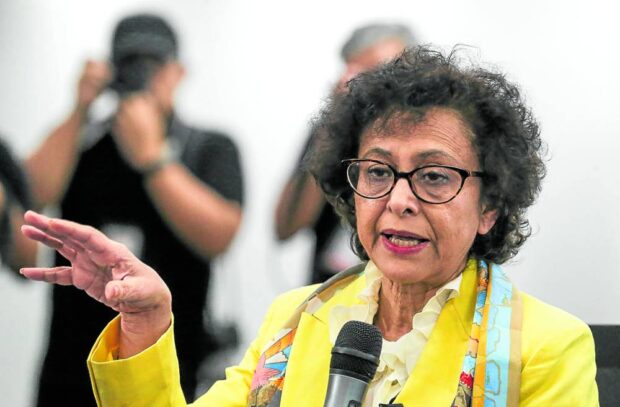
EXIT REPORT United Nations Special Rapporteur Irene Khan bares her recommendations before leaving the country on Thursday. —LYN RILLON
Although the Philippines will not face sanctions if it does not heed the recommendations of United Nations Special Rapporteur (UNSR) Irene Khan, its noncompliance could affect the Marcos administration’s “ambitious” plan to position itself as a global leader in human rights.
At the end of her 10-day visit to the country on Friday, Khan told reporters that the Philippines was vying for greater leadership roles at the international level and, therefore, has a “domestic imperative” to adhere to its obligations to the United Nations.
Khan pointed out that the Philippines currently chairs the UN Commission on the Status of Women this year and has made a bid for a seat in the Security Council in 2027-2028.
“That’s a very responsible position and that therefore puts some onus on the government to up its standards. It can hardly be a UN Security Council member and be unable or not manage its own security problems in line with UN standards,” she said.
President Marcos first announced the country’s bid for a nonpermanent seat on the UN Security Council seat during his speech at the UN General Assembly in September 2022.
Looking at 2027
During the 78th General Assembly session in 2023, Foreign Secretary Enrique Manalo appealed for the support of the United Nations for the Philippines’ candidature to the UN Security Council for the term 2027-2028.
“The Philippines is ready to represent the interests of peace-loving Member States of the Asia-Pacific in the Security Council for a better future— where the rule of law, peace and security, fairness and justice govern our daily lives,” Manalo earlier stated, as he cited the country’s peacebuilding and counterrorism initiatives, especially in Mindanao and the Bangsamoro Autonomous Region in Muslim Mindanao.
Khan, the third UNSR to visit the country under the Marcos administration, pointed out that dealing with the “grave and deep-seated human rights problems” in the country would require “fundamental and sustained reforms and a clear commitment to accountability.”
“At home and abroad, there is an expectation that the government will build on the steps it has already taken to embark on more significant legal, policy and institutional changes. It is only by doing so that it will reaffirm the image of the Philippines as a forward-looking, vibrant democracy, committed to human rights and the rule of law,” she added.
Aggravating conflict
In her exit report, Khan recommended that the government disband its anticommunist task force, which has been blamed for endangering the lives and safety of human rights defenders, activists, independent journalists and the opposition by Red-tagging them.
READ: Khan: Marcos admin ‘sets new tone’ on rights issues but still ‘not enough’
According to her, the abolition would address the “critical drivers” of Red-tagging—the practice of branding individuals as communists—and also allow the administration to advance its peace-building strategies.
Government officials, however, rejected this recommendation saying that it wasn’t yet time to dismantle the task force, which they credited with helping defeat the insurgents.